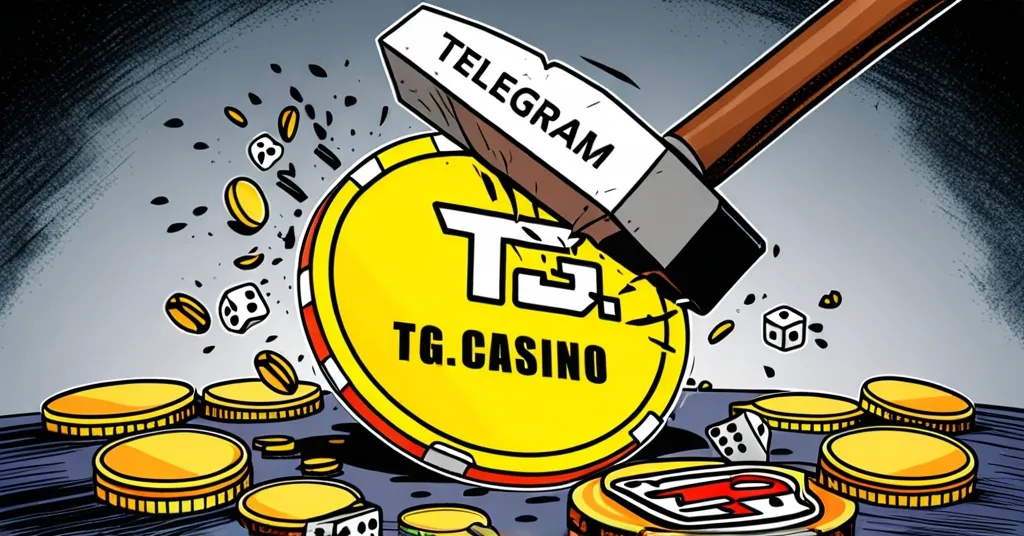Telegram Bans TG.Casino: Regulatory Crackdown or New Dawn for Crypto Gambling?

Telegram’s Hammer Drops on TG.Casino: The End or Just the Beginning for Online Gambling?
Telegram’s recent ban on TG.Casino marks a significant crackdown on unregulated gambling within the platform, reflecting broader regulatory concerns. TG.Casino’s rapid growth and unique marketing strategies, including a partnership with AC Milan, were not enough to shield it from Telegram’s decisive action.
- Telegram bans TG.Casino for violating Terms of Service
- Regulatory scrutiny intensifies on Telegram casinos
- Mega Dice emerges as a leading crypto casino alternative
In a move that sent shockwaves through the online gambling community, Telegram dropped the hammer on TG.Casino. This bold action underscores the platform’s commitment to curbing unregulated activities within its ecosystem. TG.Casino, which boldly branded itself as “the world’s fastest growing casino,” thought it could gamble with Telegram’s rules, but it rolled a snake eyes. The ban reflects growing tension between innovative gambling platforms and regulatory pressures from various governments, with countries like Indonesia and India pushing Telegram to remove such content.
Telegram casinos operate using automated programs, or “bots,” within the app to provide an immersive gaming experience. These bots appeal to a younger, mobile-first audience who enjoy the ease of accessing games directly from their messaging app. The integration of cryptocurrencies like Bitcoin adds a layer of anonymity and speed that attracts tech-savvy users. “The anonymity and speed associated with digital currencies attract many players, particularly those interested in blockchain technology,” explains a crypto gambling expert. However, this very anonymity also poses challenges, as it can facilitate fraud and complicate regulatory oversight.
The regulatory landscape for online gambling is a complex beast, varying significantly across regions. In the US, it’s a state-by-state Wild West, with leaders like New Jersey and Pennsylvania setting the pace. In contrast, Europe has more unified regulatory bodies like the UK Gambling Commission and the Malta Gaming Authority, which set standards for the industry. Major players such as Bet365, known for its extensive sports betting options, and Flutter Entertainment, a giant in online gaming, reported billions in revenue in 2023, showing the lucrative nature of the market. Yet, the anonymity provided by cryptocurrencies can be a double-edged sword, facilitating fraud and complicating regulatory oversight.
Despite the regulatory hurdles, the future of Telegram casinos looks promising, if they can navigate the regulatory minefield. The mobile gaming market is projected to generate nearly $99 billion in revenue by 2024, and Telegram casinos are well-positioned to capture a share of this younger demographic. The integration of advanced technologies like AI could further enhance the user experience, offering personalized gaming and better fraud prevention. But let’s not get too starry-eyed; increased regulatory scrutiny could lead to more bans, and the ethical concerns surrounding gambling remain a dark cloud over the industry’s future. The future prospects of Telegram casinos are a topic of much speculation.
Amidst these developments, Mega Dice has emerged as a standout crypto casino. Offering a generous welcome package, including a 200% deposit match bonus up to 1 BTC and 50 free spins, Mega Dice is attracting users with its fast cryptocurrency transactions and a loyalty program that keeps players engaged. This platform exemplifies the potential for crypto casinos to thrive in a regulatory-challenged environment. However, it’s important to note that while Mega Dice offers many benefits, it also faces potential risks such as increased regulatory scrutiny and the ethical quandaries of promoting gambling.
As the online gambling market continues to evolve, with projections to reach $100 billion by 2027, the role of Telegram casinos remains a topic of interest and debate. While regulatory challenges persist, the allure of mobile gaming and the integration of cryptocurrencies suggest that these platforms could play a significant role in the future of digital entertainment. Yet, as champions of decentralization and freedom, we must also question the implications of gambling’s integration into our beloved blockchain and crypto ecosystems.
Key Takeaways and Questions
-
What led to Telegram’s ban on TG.Casino?
Telegram banned TG.Casino due to violations of its Terms of Service, amid concerns about unregulated gambling activities on the platform.
-
How do Telegram casinos operate and what makes them appealing to users?
Telegram casinos use bots to provide an immersive gaming experience within the app, appealing to mobile-first users, and often support cryptocurrency payments for their speed and anonymity.
-
What regulatory challenges do Telegram casinos face?
They face legal and regulatory ambiguities, fraud risks due to anonymity, and potential damage to Telegram’s reputation.
-
What are the future prospects for Telegram casinos?
Future prospects include capturing younger audiences, integrating advanced technologies like AI, and adapting to evolving regulations.
-
How does the regulatory landscape for online casinos differ between the US and Europe?
In the US, regulation is state-specific, while Europe has a more unified approach with key regulatory bodies like the UK Gambling Commission.
-
Who are the major players in the online casino industry and their financial performance?
Major players include Bet365 and Flutter Entertainment, with billions in revenue reported in 2023.
-
What are the user statistics and market expansion trends for online casinos?
The online gambling market has millions of active users, with the global market projected to reach $100 billion by 2027.
-
What makes Mega Dice a standout crypto casino?
Mega Dice offers a generous welcome bonus, ongoing promotions, and supports fast cryptocurrency transactions, enhancing user experience.



